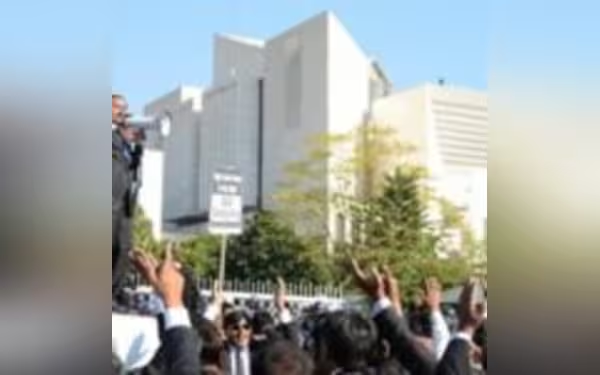Saturday, October 5, 2024 10:33 PM
PTI Chief Gohar Ali Khan Booked Over Supreme Court Protest
- PTI Chairman charged with terrorism for protest actions.
- Protestors burned effigy, resisted police intervention.
- Tensions rise between judiciary and political entities.
 Image Credits: pakistantoday
Image Credits: pakistantodayIslamabad police charge PTI Chairman Gohar Ali Khan and lawyers with terrorism over protest outside Supreme Court, escalating tensions in Pakistan.
In a significant development in Pakistan's political landscape, the Islamabad police have taken a stern stance against protests that have escalated into acts of defiance against state institutions. On Thursday, a case was registered against Pakistan Tehreek-e-Insaf (PTI) Chairman Barrister Gohar Ali Khan and 20 other lawyers, charging them with terrorism for their involvement in a protest outside the Supreme Court. This protest involved the burning of an effigy representing the head of a state institution, an act that has drawn serious legal repercussions under the Anti-Terrorism Act (ATA) and various sections of the Pakistan Penal Code.
The case was initiated by the Station House Officer (SHO) of the Secretariat Police Station, who named several prominent figures in the First Information Report (FIR). Among those listed are notable personalities such as Latif Khosa, Shibli Faraz, Salman Akram Raja, Tayyab Mustafain Kazmi, Niazullah Niazi, and Azam Swati. The FIR details how the protestors not only burned the effigy but also resisted police intervention, issuing threats and chanting slogans aimed at obstructing court rulings and disrupting judicial processes. The situation escalated further as demonstrators burned tyres, effectively blocking roads and causing significant disruption.
In a notable incident during the protest, lawyer Tayyab Mustafain Kazmi was arrested after a confrontation with Chief Justice Qazi Faez Isa during a Supreme Court hearing concerning Article 63-A review petitions. Kazmi's aggressive remarks against the judiciary, where he warned that "500 PTI lawyers were ready to oppose any ruling against the party," did not sit well with the Chief Justice. In response, Chief Justice Isa firmly stated, "You cannot run institutions through threats. My only fault is that I have always shown patience." This exchange highlights the growing tensions between the judiciary and political entities in Pakistan.
Justice Jamal Khan Mandokhail, who was also part of the bench, condemned the increasing trend of targeting judges when their rulings do not favor certain parties. This sentiment reflects a broader concern regarding the integrity of the judicial system and the rule of law in Pakistan.
The police have indicated that further arrests of other individuals named in the FIR are anticipated, signaling a robust response to what authorities view as a serious challenge to the legal framework of the country. As the situation unfolds, it raises critical questions about the balance between political expression and the rule of law in Pakistan.
The recent actions taken by the Islamabad police serve as a reminder of the delicate interplay between politics and the judiciary in Pakistan. While protests are a fundamental aspect of democratic expression, the line between lawful dissent and unlawful actions can often become blurred. It is essential for all parties involved to engage in dialogue and uphold the principles of justice and accountability, ensuring that the rights of citizens are protected while maintaining respect for state institutions.













